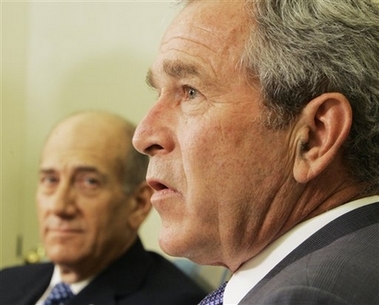Bush and Olmert seek to prop up Abbas
(AP)Updated: 2007-06-20 08:36
WASHINGTON - President Bush and Israeli Prime Minister Ehud Olmert sided emphatically Tuesday with a weakened Mahmoud Abbas, hoping extra money and warm words would give the moderate leader primacy over the Islamic militant Hamas in the newly divided Palestinian territories.
 President Bush, right, meets with Israeli Prime Minister Ehud Olmert in the Oval Office of the White House in Washington, Tuesday, June 19, 2007. [AP]  |
"Like you, I want to strengthen the moderates," echoed Olmert, who promised "to make every possible effort to cooperate" with Abbas.
It was not the first time Bush has felt the need to prop up Abbas, but this is a period of particular upheaval and uncertainty.
Bloody street battles in the Gaza Strip ended with Hamas seizing control last week of the tiny coastal territory from Abbas' Fatah security forces. The rout prompted Abbas to evict Hamas from the Hamas-Fatah coalition government, a move Hamas decries as illegal.
Nearly 3 million Palestinians now essentially have two governments. Nearly half are under Hamas control in Gaza, with the rest under Abbas' authority in the inland West Bank. Hamas is sworn to Israel's destruction, while Abbas' Fatah movement seeks peace with the Jewish state.
The response from the United States, Israel and much of the West has been swift: try to shore up Abbas in hopes that the West Bank can be made into a democratic example that would bring along Gaza.
On Monday, the Bush administration resumed aid and full government contacts with the Palestinian government, suspended in 2006 when Hamas won legislative elections.
"Our hope is that President Abbas and the prime minister - (Salam) Fayyad, who's a good fella - will be strengthened to the point where they can lead the Palestinians in a different direction, with a different hope," Bush said.
In between meetings with the president at the White House and with congressional leaders on Capitol Hill, Olmert said he would soon present his government with a proposal to free an unspecified portion of the millions in tax revenue Israel has collected on behalf of the Palestinians but has frozen since Hamas took power.
Other concrete steps to bolster Abbas will include increasing freedom of movement in the West Bank by removing checkpoints and considering the release of Palestinian prisoners, the prime minister told reporters traveling with him.
Sitting side-by-side in an Oval Office meeting planned well before the Gaza crisis unfolded, Bush and Olmert painted Abbas as the one true leader of the Palestinian people.
Both men called him the "president of all Palestinians" - an effort to confer at least as much legitimacy on Abbas' 2004 election as president of the Palestinian Authority as on the Hamas legislative wins last year. Olmert said Abbas is "perhaps the only person who was widely elected in a democratic manner by all of the Palestinian people."
Their effort got a lift from a representative of neighboring Arab states. Saudi foreign minister Prince Saud al-Faisal said those countries back Abbas' moves to dissolve the coalition cabinet, declare a state of emergency and outlaw Hamas' armed wing. "The Arab League stands firmly with the president and with the legality," he told CNN.
While the leaders heaped support on Abbas, they sought to further isolate
democratically elected Hamas by doing just the opposite.
| 1 | 2 |  |
|
||
|
||
|
|